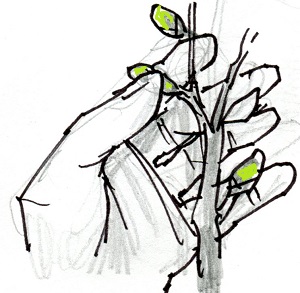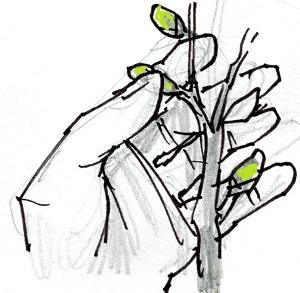

“Learn a lesson from the fig tree” (Mark 13:28).
Thirty-Third Sunday in Ordinary Time
Dn 12:1-3; Ps 16; Heb 10: 11-14, 18; Mark 13:24-32
At the end of the church year we are invited to reflect on the “Last Things” -- Death, Judgment, Heaven and Hell. We sober up to consider the inevitability of our own deaths, to remember those who have gone before us, and to imagine the end of the world. As if we do not already have enough disaster movies on TV, the nightly news on climate change and the collapse of democracy offers enough doom and gloom to fuel our worst nightmares. Is there any Good News for us in today’s readings?
The Gospel writers had actual threats to prompt them to review the apocalyptic scenes from Ezekiel and Daniel as portending the Second Coming and the end of the world. Paul comforted the Thessalonians with the promise they would be raptured, and the author of Revelations relished the punishment God would pour out on Rome for its crimes. Mark’s Gospel quotes Jesus on the time of desolation and the Son of Man’s promise to come in the clouds and send out his angels to gather the elect.
Jesus compares the coming judgment to the arrival of summer signaled by the greening of the fig tree: “Learn a lesson from the fig tree.” The logic of the lesson is clear, but the mention of a fig tree also recalls that just two chapters before, Jesus seems to have learned a lesson from a fig tree himself that has significance for the themes in today’s liturgy.
In Mark 11:12-22, Jesus is on his way from Bethany to Jerusalem to rout the money changers from the temple when he stops to pick some figs from a tree because he is hungry. But there are none because it is out of season. In an uncharacteristic show of anger, Jesus curses the tree. The disciples take note, and we are left to wonder if business as usual in the temple is not the real target of Jesus’ anger. After all God’s blessings, Jerusalem has borne no fruit. What can follow but inevitable punishment?
Arriving at the temple, Jesus unleashes his fury on the corruption the chief priests have allowed to turn God’s house into a den of thieves where powerful interests conspire over money. His wrath is prophetic and justified, but it apparently does not sit well with Jesus, as evidenced by what happens the next day. As they walk past the fig tree again, “withered to the roots,” Peter points this out to Jesus. But instead of nodding his approval, Jesus launches into an affirmation of the power of prayer. “Have faith in God,” he cries. “I tell you, whatever you ask for in prayer, believe that you have received it, and it will be yours. And when you stand praying, if you hold anything against anyone, forgive them, so that your Father in heaven may forgive you your sin.” (12:24-25).
What Jesus himself learned by cursing the fig tree and, symbolically, Jerusalem for not bearing fruit, he now teaches his disciples. What wrath cannot accomplish, mercy and reconciliation will. On the eve of his own death, already being plotted, Jesus knows that his apparent failure to save the nation will lead to the ultimate sign of God’s enduring love for sinners, even at the cost of his Beloved Son. Jesus will offer himself to save the world, a paradox beyond human comprehension, yet it reveals the depth of divine mercy.
What is the lesson of fig tree for us? We wonder if it is too late now to avert catastrophe because of our failure to change our ways. Isn’t the lesson that instead of being paralyzed by despair, cynicism and inaction, we can still affirm our faith and deepen our prayer? As the actual threats to our world multiply, Jesus says, “Truly I tell you, if anyone says to this mountain, ‘Go, throw yourself into the sea,’ and does not doubt in their heart but believes that what they say will happen, it will be done for them.”
If we join his promise to the determination of thousands of young people at the COP26 meeting in Glasgow or those demanding voting rights in our streets instead of doom and gloom, we can embrace a rebirth of hope waiting to be accomplished with God’s help. Good News indeed.
Advertisement








